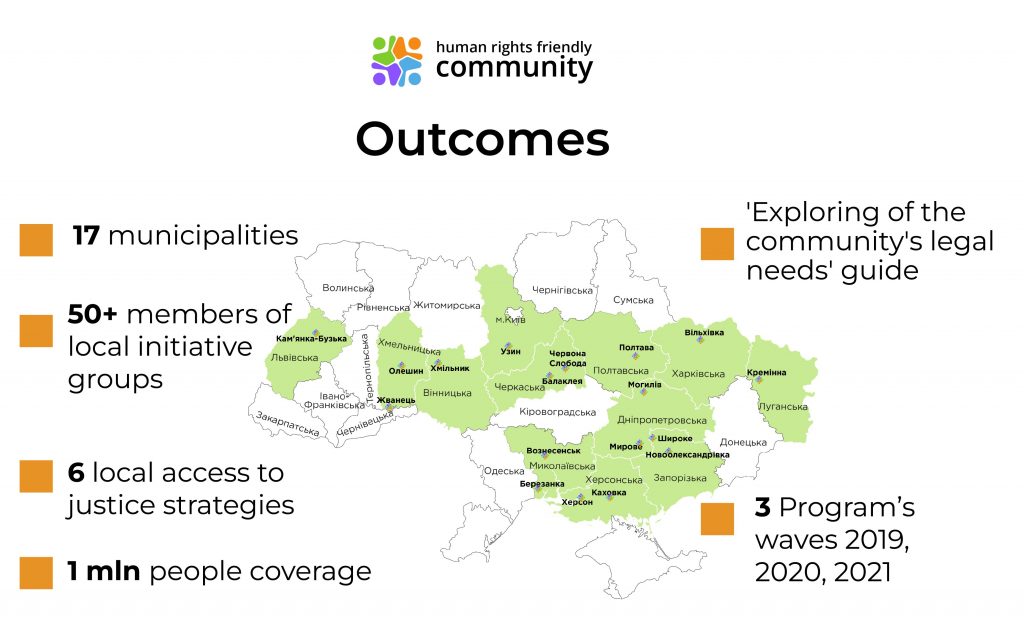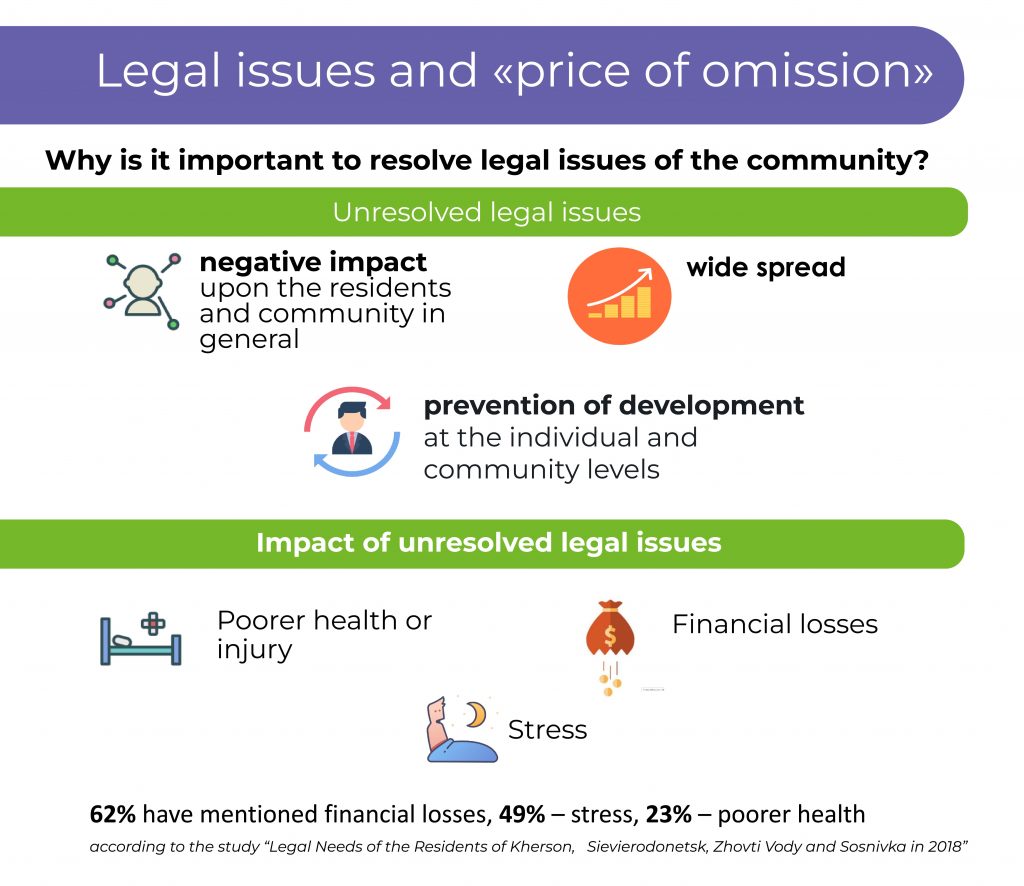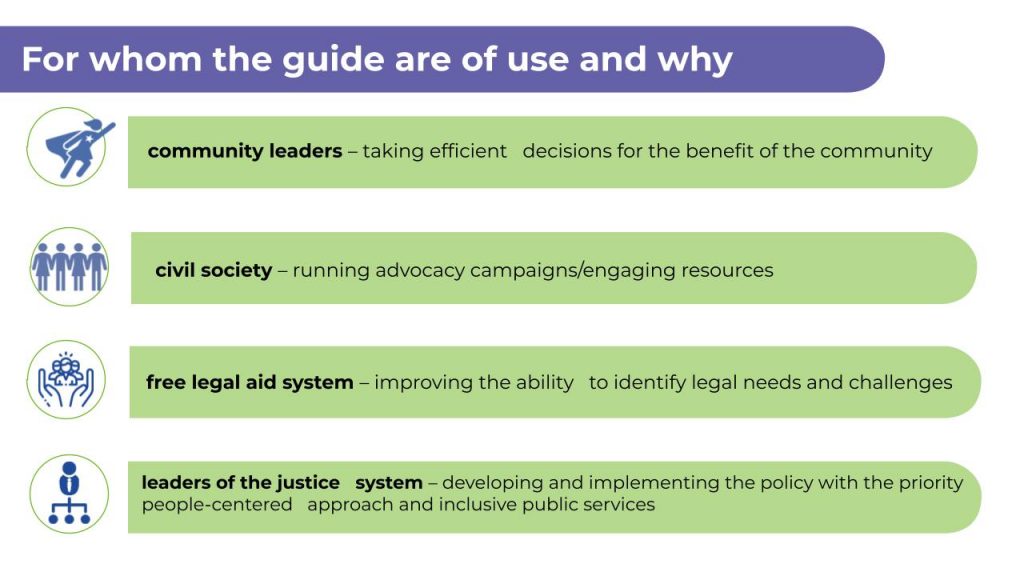Legal Development Network Presents the Studying the Legal Needs of the Community Guide
Publication date: February 17, 2022
Written by: Halyna Kolesnyk, the Communications Manager of the Legal Development Network.
At the end of October, 2021, the experts of the Legal Development Network presented the practical Studying the Legal Needs of the Community Guide in Zaporizhzhia.
The resource was presented at the final conference of the project dedicated to improvement of access to justice of the rural communities in the East of Ukraine, which was implemented by a member organization of the Legal Development Network, Strategies and Technologies for Effective Partnership (STEP). The STEP representatives were among the pioneers of the Human Rights Friendly Community Program.

The guidel include their experience as well as experience of the other organizations, which studied and implemented their solutions to improve the access to justice in seventeen communities of twelve Ukrainian regions during three waves of the program.
Vitalii Okhrimenko, the Programme Manager of the Legal Development Network and Expert of the Human Rights Friendly Community Program, explains why they have managed to develop the Studying the Legal Needs of the Community guide,
“We tried making the guide after the first year, but we were not sure that each section had stood the test of time. We wanted to fill it with the real examples, especially successful ones: successful study design and program, advice that is efficient in small settlements. We considerably improved the program method year by year, and we now have the essence of practical experience: how to draw samples based on the limited data; how to train interviewers from among the community members, and how to organize their work; how to analyse the data without an external expert, and how to make solution implementation road maps based on this analysis. The synergy of the experience gained during our work with the communities helped draft the guide with specific examples. Now any active and motivated community can use these guide for significant progress in the development of its local eco-systems for access to justice.”
The experience of the Human Rights Friendly Community Program is unique because it involves the participation approach during the study. It has been mentioned by Yevgen Poltenko, the Executive Director of the Legal Development Network,
“For the last three years, the approach to the community study strategies has considerably changed in the context of the concept of expertise: who an expert is and what values are a basis for studies. The study process used to require external experts, but the paradigm is changing. The stakeholders’ representatives are becoming co-researchers and take part in decision making during the study, from the formation of the question to be answered by the study to the interpretation of the study findings. The Human Rights Friendly Community Program creates the space for the collaborative study process where researchers are initiative groups in the community that become agents of reasonable changes rather than try to adapt the community needs to the existing services.”
.
“Legal aid seems to be an eternal process with no beginning or end. This idea often limits attention to challenges and suspends search for solutions by the entities with the program planning principle framework. The guide offers the solution as to search for the tools and determination of the indicators of success that enable the translation of the language of challenges into the language of solutions, which is of great value,” emphasizes Roman Romanov, the Director of the Human Rights and Justice Programme of the International Renaissance Foundation.
On the Guide

Access to justice is actually the immune system of society. It is supposed to help resolve the existing issues, prevent complications, and avoid the occurrence of new issues of prejudice both to a specific person and the community or entire society. Detailed understanding of the actual access to justice is a determinant factor in the resolution of the legal issues and satisfaction of the legal needs of the community residents. In its turn, it helps develop efficient national and local strategies and policies, efficient interference programs and smart models to finance the justice system. It is described in more detail in the first section of the guidel.
The following parts of the guidelines are of applied nature. They describe the establishment of the study group, planning of the study and sources of data, public surveys, more focused and in-depth studies, processing of the data obtained, selection of tools to influence the identified issues, and advocacy of implementation of the solutions.
The last part of the guide contains specific examples of elements of the study program and references to useful resources.

The Studying the Legal Needs of the Community Guide will be of special use to all those in need of reliable data on legal issues of people and interested in the study and most efficient resolution thereof:
• community leaders – taking efficient decisions for the benefit of the community;
• representatives of the civil society – running advocacy campaigns or engaging resources to resolve the issues;
• representatives of the free legal aid system and human rights defenders – improving the ability to identify legal needs and challenges in the community;
• leaders of the justice system – developing and implementing the policy with the priority people-centered approach.
The guide helps obtain data on people’s legal needs and challenges, have sufficient tools to resolve legal issues, and develop and implement strategies to create the local eco-systems of access to justice. The experts of the Legal Development Network believe that this is the only way to obtain real justice for all. The Studying the Legal Needs of the Community Guide are an applied tool to expand the opportunities to develop human rights friendly communities.
*The eco-system for access to justice at the level of the territorial community means the infrastructure available in the community to resolve the legal issues. Legal support in resolution of legal issues of the community residents can be provided by: municipal institutions and organisations (within their competence, including legal units, housing and utility and urban development, education, social service, medical service and culture units, village elders; administrative service centres, etc.); central and local authorities (within their competence); specialised civil society organisations; governmental free legal aid centres (where there is an office in the area, during mobile visits). Moreover, the community can have additional elements of the infrastructure to resolve legal issues, which can provisionally include the following institutions and their experts: municipal institutions, agencies and enterprises (for instance, in the area of educational, social and health care services); theNational Police officers (namely, police officers of the community (if any)); staff of the cultural centers and libraries.
P.S. The training and practical Human Rights Friendly Community Programme has been implemented by the UA2J School of Practice since 2019 based on the network of legal clubs #PRAVOKATOR, with the support of Coordination Centre for Legal Aid Provision, International Renaissance Foundation, Ukrainian Legal Aid Foundation, partner organisations and institutions, and is administered by the Legal Development Network.
The material represents the opinion of the authors and does not necessarily coincide with the stance of the International Renaissance Foundation.
P. S. In June 2024, the Legal Development Network (LDN) launched a crowdfunding campaign, Recovery of The South of Ukraine , as part of the crisis response program #StandWithUkraine.
You can Recovery of The South of Ukraine |
If you have notices an error on the web-site, please, highlight the text and press ctrl-enter.
Have you found your solution? Help others!
Print a poster
Print and place the Network's poster on a notice board in your entrance hall
Become a volunteer
Become a volunteer and assist others in finding problem solutions
Do you need a consultation ?
Online chat
Поставте питання, i один з експертiв Мережi надасть вiдповiдь.
Графік роботи чату: з 10:00 до 16:00
щодня
(обідня перерва з 13:00 до 14:00).
Chatbot
Поставте питання через LawLink Bot в будь-який зручний спосіб. LawLink Bot — це розумний та цифровий юридичний помічник, якого створила Мережа правового розвитку.

